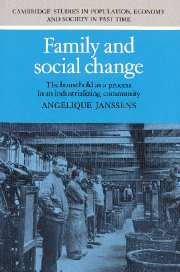Book contents
- Frontmatter
- Contents
- List of figures
- List of tables
- List of appendices
- Preface
- 1 Family and industrialization
- 2 The industrializing context: continuity and change in nineteenth-century Tilburg
- 3 Sources and methods
- 4 Family structure through time
- 5 Family life and the social structure
- 6 Family structure and geographical mobility
- 7 Family and work: the effect of the family economy on the structural characteristics of the household
- 8 Conclusion
- Appendices
- Bibliography
- Index
- Cambridge Studies in Population, Economy and Society in Past Time
7 - Family and work: the effect of the family economy on the structural characteristics of the household
Published online by Cambridge University Press: 05 March 2012
- Frontmatter
- Contents
- List of figures
- List of tables
- List of appendices
- Preface
- 1 Family and industrialization
- 2 The industrializing context: continuity and change in nineteenth-century Tilburg
- 3 Sources and methods
- 4 Family structure through time
- 5 Family life and the social structure
- 6 Family structure and geographical mobility
- 7 Family and work: the effect of the family economy on the structural characteristics of the household
- 8 Conclusion
- Appendices
- Bibliography
- Index
- Cambridge Studies in Population, Economy and Society in Past Time
Summary
The final issue to be considered in this study concerns an examination of the relationship between changes in family dynamics and the transformation of the household from a productive unit into the type of household exclusively directed towards consumption and wage-pooling. Structural-functionalist theory considered this segregation between the family and the economy to be crucial to the emergence of the nuclear family in industrial society. In addition, a large number of writers in the field of family history have attached great importance to what is generally referred to as the family's ‘loss of productive functions’. The present chapter deals with the effect of this structural process of transformation of labour on the working-class family in nineteenth-century Tilburg.
Family and factory
In the previous chapters family characteristics were examined for a number of socio-economic groups in what we might call the ‘industrializing context’ of nineteenth-century Tilburg. However, not all of the households we have studied so far experienced in equal degrees the influence of this transformation of economic structures. Some of them were clearly positioned in more traditional artisanal sectors of society, escaping the influence of mechanization and centralization of production until well into the twentieth century. Late-nineteenth-century carpenters, butchers and bakers, bricklayers and shoemakers in Tilburg may have lived their working lives very much along the lines followed by preceding generations. They were the least involved in the process of differentiation of their social and economic context.
- Type
- Chapter
- Information
- Family and Social ChangeThe Household as a Process in an Industrializing Community, pp. 193 - 232Publisher: Cambridge University PressPrint publication year: 1993



